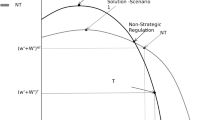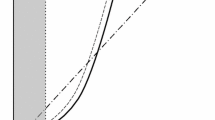Abstract
A key, and often controversial, issue in environmental negotiations is the appropriate extent of harmonization of environmental policies. This paper, within a general equilibrium model of international trade with endogenous pollution discharges, identifies instances in which pollution-tax harmonization can deliver potential Pareto improvements.
Similar content being viewed by others
References
Baumol WJ, Oates W (1988) The theory of environmental policy. 2nd edn. Cambridge University Press, Cambridge
Copeland RB (1994) International trade and the environment: policy reform in a polluted small open economy. J Environ Econ Manag 26(1): 44–65
Chen X, Woodland A (2011) International trade and climate change. University of New South Wales, Mimeo
Cremer H, Gahvari F (2004) Environmental taxation, tax competition, and harmonization. J Urban Econ 55(1): 21–45
Delipalla S (1997) Commodity tax harmonisation and public goods. J Public Econ 63(3): 447–466
Dixit A (1985) Tax policy in open economies. Handb Public Econ 1(1): 313–374
Hatzipanayotou P, Lahiri S, Michael M (2008) Cross-border pollution, terms of trade, and welfare. Environ Resour Econ 41(3): 327–345
IPCC (2007) Climate change 2007—mitigation of climate change. Working group III contribution to the fourth assessment report of the IPCC, Cambridge University Press
Jones B, Keen M, Strand J (2012, forthcoming) Fiscal implications of climate change. Int Tax Public Financ
Keen M (1987) Welfare effects of commodity tax harmonization. J Public Econ 33(1): 107–114
Keen M, Kotsogiannis C (2011) Coordinating climate and trade policies: Pareto efficiency and the role of border tax adjustments. University of Exeter discussion paper #11/06
Kotsogiannis C, Myles G, Lopez-Garcia M-A (2005) The origin principle, tax harmonization and public goods. Econ Lett 87(2): 211–219
Kotsogiannis C, Woodland A (2011) Climate and international trade policies when emissions affect production possibilities. University of Exeter, mimeo
Lahiri S, Raimondos-Moller P (1998) Public good provision and the welfare effects of indirect tax harmonisation. J Public Econ 67(2): 253–267
Michael M, Lahiri S, Hatzipanayotou P (2011) Piecemeal reform of domestic indirect taxes toward uniformity in the presence of pollution: with and without a revenue constraint. Southern Illinois University Carbondale discussion paper #2011-01
Neary J (2006) International trade and the environment: theoretical and policy linkages. Environ Resour Econ 33(1): 95–118
OECD (l974) Environmental standards: definitions and the need for international harmonization, Paris
Porter EM, van der Linde C (1995) Toward a new conception of the environment-competitiveness relationship. J Econ Perspect 9(4): 97–118
Santoro A (2007) Marginal commodity tax reforms: a survey. J Econ Surv 21(4): 827–848
Turunen-Red A, Woodland A (2004) Multilateral reforms of trade and environmental policy. Rev Int Econ 12(3): 321–336
WTO (2004) Trade and environment at the WTO. World Trade Organization, Geneva
WTO (2009) Trade and climate change. World Trade Organization, Geneva
Author information
Authors and Affiliations
Corresponding author
Rights and permissions
About this article
Cite this article
Vlassis, N. The Welfare Consequences of Pollution-Tax Harmonization. Environ Resource Econ 56, 227–238 (2013). https://doi.org/10.1007/s10640-012-9588-9
Accepted:
Published:
Issue Date:
DOI: https://doi.org/10.1007/s10640-012-9588-9




